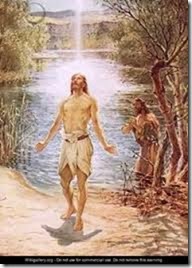Dear William,
Thank you for Christian Unity sharing.
This evening, the Chapter Room, the Abbot's talk quoted from a Subiaco Benedictine of Chilworth. "The good monk is is the best balance life if he has a 'chip' in both shoulders!" The Abbot was talking about the life of silence in the monastic life.
Maybe, there is an application here in the communion of Christian life.
And your words lead on to the Sirit of tenderheartedness.
"Come and take My infinite tenderness. - '...dans Ma douceur infie'." (He AND i).
Yours ...
Donald
----- Forwarded Message
-----
From: William W....
To: Donald....
Sent: Wednesday, 23 January
2013, 16:32
Subject: Christian unity ...
abandon the cause, embrace the reality
Dear
Father Donald,
This
may not be a welcome comment [so please forgive and ignore me], but it
arises too often for me not to present it to someone, and this is the only
'forum' I know: I have a belief in a loving devotion to Our Lord
regardless of whichever 'church' to which one 'belongs'... but to fulfil this
bond of unity one thing greatly troubles me:
Christian
Unity.... cannot be forged on the basis of dogma. The principles of disunity
are the 'definitions' (especially over the 'Eucharist') and
the 'devotions' (particularly 'Marian') and 'liturgical' (formalisation) -
I experienced all three in becoming a Catholic. The 'poles apart' are
extremes only observed at the level of heirarchy, or
through dependant conservatism in the rank and file.
In
the pews, where warm hearts welcome others, there are no such 'certainties' (!)
on either side, rather all is determined by an individual's devotional
response to Our Lord, which often is affected by upbringing and example,
education and culture. Yes, each Church must needs 'define' its beliefs, but it
is only at the deep intellectual level that the differences can form a barrier
to unity. Intellectual arguments seldom agree (!), but those should not
stand in the way of unity. Unity
is the voice of the people, the crowds before the mount of the Beatitudes.
I
have never walked into a room full of people who might agree on all matters of
opinion (which is the common word for forms of
belief), yet goodwill and acceptance of another's views draw all men together
as a united humanity. Could the Church never allow personal devotion -
well versed in its catechism, in its own belief - over the strictures
of definitions?
Let
us imagine that we together greet Our Lord on the shores of Galilee: we will
all approach him in varied ways: there will be those who 'formalise' him, those
who greet him with 'emotion', those who deeply 'reflect' on his presence. Why
can't we all meet him, greet him, worship him together in our own way as
the Spirit gives us? We are there, he is present, with no one analysing their
system of belief.
The
Eucharist is for me uniquely special, for my neighbour a memorial, for the
other a sharing in the loaves and the fishes: but we can receive him all
together in
our own way?
Simplistically,
William








 It just so happens that the lens the Catholic tradition uses to read the story flows from Scripture itself–to be precise, it flows from the connection between holy words written hundreds of years apart. But despite the many years and different human authors, the texts were inspired by the same Divine Author, the Holy Spirit. In chapter 60 of Isaiah (Is 60:1-6), it is predicted that at a time of darkness, the glory of the Lord will shine over
It just so happens that the lens the Catholic tradition uses to read the story flows from Scripture itself–to be precise, it flows from the connection between holy words written hundreds of years apart. But despite the many years and different human authors, the texts were inspired by the same Divine Author, the Holy Spirit. In chapter 60 of Isaiah (Is 60:1-6), it is predicted that at a time of darkness, the glory of the Lord will shine over Myrrh, an aromatic resin, was used in preparing the dead for burial. Gold reveals that the babe in the manger is actually a king; frankincense tells us that is he God incarnate; myrrh tells us that he has come to die. That someone would redeem God’s people through suffering and death was foretold by Isaiah a few chapters earlier (Is 53). This was the really hard thing for those living in Jesus’ time to comprehend–that the same person who fulfilled all those prophecies about a glorious new king also fulfilled the prophecies about a suffering servant.
Myrrh, an aromatic resin, was used in preparing the dead for burial. Gold reveals that the babe in the manger is actually a king; frankincense tells us that is he God incarnate; myrrh tells us that he has come to die. That someone would redeem God’s people through suffering and death was foretold by Isaiah a few chapters earlier (Is 53). This was the really hard thing for those living in Jesus’ time to comprehend–that the same person who fulfilled all those prophecies about a glorious new king also fulfilled the prophecies about a suffering servant. The ancient feast of the Epiphany actually celebrates three events, tied together by the meaning of the word epiphany as “appearance” or “manifestation.” Jesus suddenly appears as who He really is–messiah and God–to the Magi, at Cana when he works his first miracle, and when he is baptized in the
The ancient feast of the Epiphany actually celebrates three events, tied together by the meaning of the word epiphany as “appearance” or “manifestation.” Jesus suddenly appears as who He really is–messiah and God–to the Magi, at Cana when he works his first miracle, and when he is baptized in the




